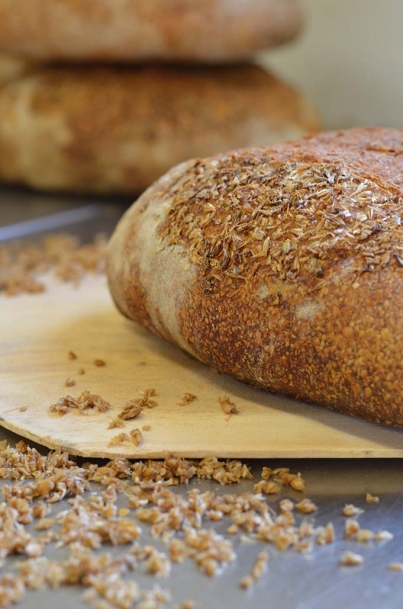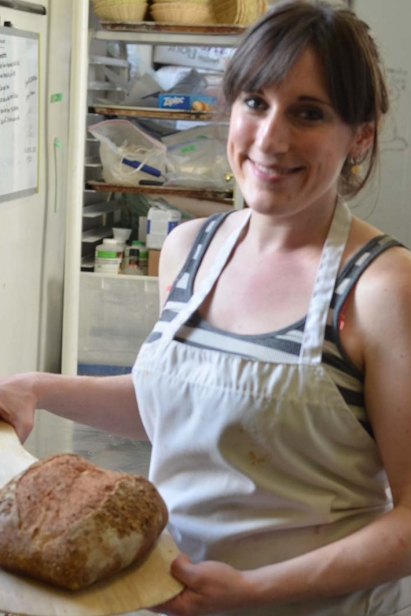Beer's Leftovers
For Ottawa baker Natali Harea, using beer brewing's unwanted leftovers simply makes sense.
"Beer and bread, they're actually really similar in how they're made," says Harea, the owner of Nat's Bread Company. "One of the only differences is that you're baking bread and nobody gets a buzz off of it."
Harea is one of an increasing number of bakers, chefs, brewers and farmers in Ottawa who subscribe to the philosophy that spent grain — all the barley and rye and oats that have had their sugars plundered and converted into beer by thirsty brewers — should be treated as something more than just a waste product.
Spent grain might be a bit unfamiliar to non-brewers, but if you've ever made porridge, it's not that hard to picture. To make beer, commercial brewers typically let a large amount of grain steep in a giant metal contraption called a mash tun in hot water until the grain has softened and released its grip on its sugars. That liquid — and this is huge oversimplication — gets diverted away and, with the help of yeast and hops and a fair bit of patience, eventually becomes ale or lager.
The leftover porridge mixture? That's the spent grain.
"They have this intense beer smell to them," says Harea of the grains she picks up from Kichesippi brewery and hauls to her Old Ottawa East kitchen on the campus of St. Paul's University, where she adds them to the crust of her whole wheat sourdough. The bread's shipped daily to the Ottawa Bagelshop and Deli in West Wellington, says Harea, and on weekends to Around the Block Butchershop in Ottawa's west end near the IKEA.
"I wouldn't say it's a main ingredient. It's more like, if you were to add nuts or seeds to your bread," says Harea. "We still use wheat flour and rye, and that sort of thing. But we use the grain as kind of an added flavour."
Local brewers are often only too happy to find someone such as Harea who'll divest them of part or all their spent grain. Homebrewers can toss their grain in the compost bin — if they're not up for trying one of the many bread, scone, muffin or granola recipes available online — but on the commercial scale, that's a bit less feasible.
"Brew day No. 1 was happening, and I had no solution," says Matt Tweedy, owner and chief brewer at Hintonburg's Tooth and Nail, which opened in the fall of 2015.Tooth and Nail isn't the largest brewery in the city, but even it generates a ton of spent grain. And that's not an exaggeration: Tweedy says he uses about 375 to 500 kilograms of dry malt for every batch of beer, and when it's wet, that malt weighs about two-and-a-half times as much.So after every brew day, Tweedy has to find a home for upwards of 1,000 kilograms of soggy barley mash. Like many Ottawa brewers, he's struck a partnership with a local farmer — in his case, the owners of Älska Farm, a small family-run operation in Farrellton, Qué., that produces all-natural maple syrup and organically raised pork.
The pigs at Älska love spent grain, says Tweedy, especially when they toss in a little leftover yeast and let any remaining sugars get broken down even further.
"It's a really nice way to divert our garbage and put it to a good place." We could put it in a green bin, but why not make a relationship with a farmer instead," asks Tweedy. "And down the road there could be tradeoffs. Maybe I'll get bacon out of it. Who knows?"
The folks at Bicycle Craft Brewery also divert a significant portion of their leftover grain to local farmers — but brewery co-founder Laura Behzadi makes sure to bring some home with her at the end of the day. The grains end up in her falafel — a great recipe because you can use the grain "just as it is out of the mash tun," mashed up with some chickpeas and parsley — but also, says Behzadi, in her dog's food bowl.
"One thing I try to make regularly is dog biscuits for our lab, Musket. He likes the peanut butter ones we make," Behzadi says. "It turns into a nice crispy and all-natural treat for our dog. He loves it."
Perhaps the fanciest use of spent grain in Ottawa is at Beckta, where sous-chef Shane Brown has infused cream with it and used it as the base for a parsnip purée. He's also baked spent grain pretzels, served with honey-mustard sweetbreads, most recently featured on one of the restaurant's fall 2015 tasting menus.
Like most of the chefs and bakers in Ottawa who work with spent grain, Brown's philosophy is simple: there's no need to let potential foodstuffs, especially something that's still imbued with the malty, complex flavours of carefully brewed craft beer, go to waste.
"There's still a bunch of flavour there," says Brown. "We're putting it to a second use."






